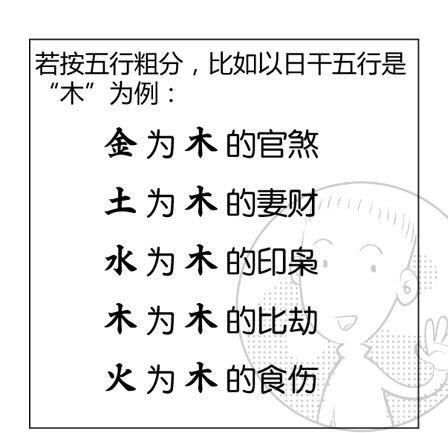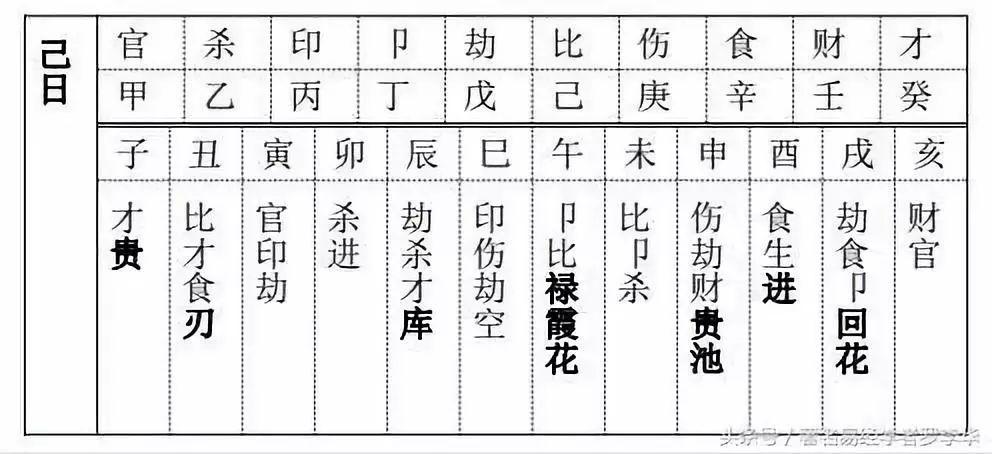1. Eight characters adopt a son Ten gods
The three words, Bazi (八 八字), Zi Zi (养子) and Ten Shen (十神), represent different themes. Bazi is an important concept in traditional Chinese culture, which is used to represent the combination of heavenly stems and earthly branches of the year, month, day and hour of a person's birth, so as to project his fate and fortune. An adopted son, on the other hand, is a kind of foster child who teaches someone's children, whether they are biological children or orphans. The Ten Deities, on the other hand, is the name given to the relationship between the stems and branches in Baziology, and is used to analyze a person's personality, preferences, and phases and relationships. Below, I will analyze each of these three perspectives.
As one of the most important theories of ancient fortune telling, the eight characters occupy an important position in traditional culture. Bazi fortune telling is a complex and profound study, which analyzes a person's destiny and fortune mainly by speculating the heavenly stems and earthly branches of his birth. Bazi is ubiquitous and is widely used in marriage, medicine, career and other fields. By analyzing the five elements of the Bazi, namely Jin, Wood, Water, Fire and Earth, one can project a person's personality, physical health, career development and other aspects. In traditional Chinese culture, the importance of the eight characters is self-evident.
Adopting a child is a common behavior in life. Adopted children can be divided into two cases: biological children and adopted children. In either case, adopted children need to be educated and nurtured. The parenting style is directly related to the growth and development of the child. For the education of adopted children, parents should focus on cultivating their children's ability to be independent, helping them to overcome difficulties and setbacks, and cultivating positive qualities and good moral values. At the same time, adopted children also need parents' attention and companionship to cultivate good family relationships. Adopting a child is a responsibility and obligation, but also a kind of joy and happiness.
In the study of the Eight Character, Ten Gods is an important concept. The Ten Gods is the name given to the interrelationships between the stems and branches in the Eight Characteristics, and is divided into ten different gods: positive wealth, partial wealth, injurious official, god of food, positive official, partial official, positive yin, partial yin, rest, and fetus. Different Ten Deities represent different relationships and interactions. Based on the relationship of the ten deities between different stems and branches in the Eight Characteristics, one can analyze one's character and compatibility with others. For example, Zheng Cai represents one's financial fortune, while Zheng Guan represents one's authority and high position. By analyzing these Ten Deities, one can better understand a person's personality traits and how they get along with others.
The three themes of the Eight Signs, Raising Children, and Ten Deities represent important concepts in traditional culture of numerology, family education, and the interrelationship of the stems and branches, respectively. Bazi is one of the most important theories of ancient fortune telling. By analyzing the eight characters of a person's birth, one's fortune and destiny can be projected. Adoption, on the other hand, is a common behavior in life, and it is crucial for parents to educate and nurture their adopted children. In Baziology, on the other hand, Ten Deities is the name given to the relationship between different stems and branches, which allows one to analyze the compatibility between people. All three themes embody the close relationship between human beings and destiny, and between people, and are important guides to understanding human nature, raising children, and improving interpersonal relationships.

2. Will the eight characters of an adopted son affect the adoptive parents
Will the adopted son's birthdate affect the adoptive parents?
The adopted son's eight characters is a traditional fortune-telling technique, with the help of the theory of heavenly stems, earthly branches and five elements, by projecting a person's birthdate in order to predict his or her character traits and development trends. Is it possible that the eight characters of an adopted son will have an impact on the adopted parents? This is an intriguing question.
We need to understand the significance of the eight characters for a person. The Eight Characters contain four elements: year, month, day, and hour, each of which has a corresponding Heavenly Stem and Earthly Branch. Through the combination of the Heavenly Stems and Earthly Branches, one can deduce the attributes of one's five elements, and accordingly predict one's character, fate, and so on. Bazi is only a fortune-telling tool and cannot completely determine a person's life. A person's destiny is the result of many factors, including personal efforts, environment, education and so on. Therefore, the eight characters of an adopted child will not have a direct impact on the adoptive parents.
The adopted son's Eight Character may have some indirect influence on the adoptive parents' parenting style. Some factors in the Eight Characters, such as the individual's Heavenly Frame, Earthly Frame, Personality and Career House, can give some character references. For adoptive parents, understanding the Eight Characteristics of their adopted child can help them to more accurately recognize the child's personality traits and potential developmental tendencies, so that they can formulate a more appropriate education plan and cultivation direction. For example, adoptive parents can learn that their adopted child has a talent for hobby arts and performing arts through understanding his/her eight characters, then they can provide him/her with more relevant nurturing opportunities and resources to promote his/her developmental potential.
At the same time, adoptive parents also need to be aware that their adopted son's Bazi is only a reference and cannot be the sole criterion for raising a child. Because everyone's upbringing and experiences are different, the adopted child's eight characters can provide some clues to his or her personality, but it still can't completely determine a person's life. Adoptive parents should use the adopted child's eight characters as the basis, combined with his actual situation and personal needs, to formulate a scientific and reasonable education and training programs to cultivate his overall development.
Adoptive parents should also pay attention to their adopted children's mental health and growth. The adopted son's eight characters can only provide some superficial character traits, but not an in-depth understanding of the adopted son's inner world and psychological needs. Therefore, in the process of parenting, adoptive parents should establish a good communication channel with their adopted children, care for and understand their inner feelings, and give appropriate care, support and guidance as needed.
The adopted son's eight characters have no direct influence on the adoptive parents, but only provide some clues to the character traits. For adoptive parents, understanding their adopted child's eight characters can help them to understand and know their child more accurately and develop appropriate education and nurturing programs. Adoptive parents should note that their adopted child's eight characters are only a reference and cannot be the sole criterion for raising a child, and they also need to pay full attention to their adopted child's mental health and inner needs. Adoptive parents should raise their children in a scientific and rational way to provide a good environment and support for their overall development.

